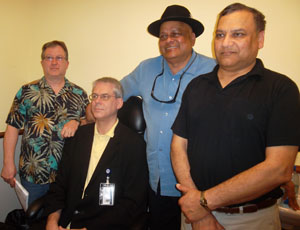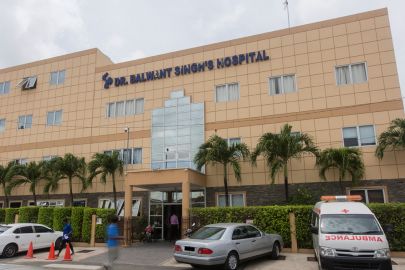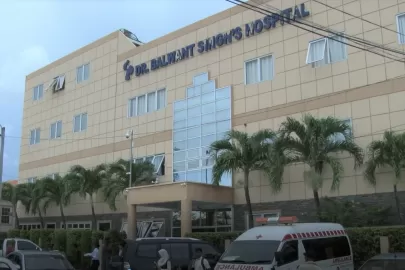From left: David Oliver, Dr Stephen Guy, George Subraj and Dr Rahul Jindal
– as two more successful transplant operations are completed.
The introduction of an initiative aimed at encouraging the voluntary donation of a kidney was suggested yesterday by United States-based Philanthropist, George Subraj, when he addressed a press conference at the Balwant Singh Hospital.
The press conference was aimed at providing an update on recent kidney transplant operations which were spearheaded by expert transplant surgeon, Dr Rahul Jindal, and a team of overseas-based experts at the private hospital during the past week. The two patients who were operated on are in their late 40s and are both said to be doing well.
According to Subraj, who has for a number of years been financially responsible for bringing in the overseas expert to facilitate the kidney transplant mission, “we all have two kidneys and it is not as if you give one away that the other will shut down; you will still continue to make babies, cook, eat…and live a full life.”
“We are appealing to the general public to consider starting to donate one kidney. I would personally like to see some sort of a registration where people register to donate a kidney…We need the general public to be involved in this.”
Subraj also spoke of the high cost of undertaking the kidney transplant operation overseas even as he insisted that “we will definitely be saving some lives just by bringing these guys here. It costs a lot to bring them here but the most important thing is to have the Dr Balwant Singh Hospital which is willing to help.”
The kidney transplant programme was introduced a few years ago at the Georgetown Public Hospital Corporation. It has since been diverted to the private facility but with continued support from the Ministry of Health, according to Subraj.
He explained that the Ministry’s contribution to the kidney transplant mission includes transporting the health team and the provision of live-long medication to the patients operated on.
He explained that the public must gain the understanding that diseases such as diabetes, heart condition and high blood pressure are often linked to diet and lifestyle but with the support of the various experts these preventable problems could be addressed.
Speaking of the sustainability of the transplant programme, Dr Jindal, who is attached to the Walter Reed Army Medical Centre in Washington D.C., said that the recently elected government has given its assurance to continue to support the programme.
“Although we are not doing surgeries at the Georgetown Public Hospital they are still supporting us because these patients require expensive medication…Mr Subraj met with the Minister of Health, Dr Bheri Ramsaran, and he is committed to supporting, and so in this way it is a continued public-private partnership.”
“There are many pieces in the puzzle; we have George Subraj from Zara Realty in Queens, New York, providing the funding, the Balwant Singh Hospital they are writing off a lot of the cost and expenses because if you try doing the accounts it is very expensive.”
He revealed that in the United States for instance, a kidney transplant operation could cost in excess of US$150,000 today while in the past when different charities were engaged in taking patients to India it amounted to about US$60,000 but lacked the follow-up care.
It is for this reason that Dr Jindal has been calling for a system to be put in place where there is sustained follow-up of patients. At the moment, he said that the service provided at the Balwant Singh hospital is not limited to those who were operated on there but persons who were treated overseas can also access follow-up care.
Another member of the team, David Oliver, also of the Walter Reed Army Military Medical, is tasked with supporting all spectrums of kidney diseases ranging from prevention to treatment and transplant related issues. With a focus on the technical aspects, he revealed that his goal here in Guyana is to ensure that the need for his presence here becomes obsolete.
As such he is geared to train a few local health workers to support dialysis and the transplant programme. He nevertheless commended the efforts of the local support team that has been assisting the overseas team.
Transplant Surgeon, Dr Stephen Guy, another team member, said that he joined the team about one year ago, with this trip making it his fourth visit offering transplant service and other evaluations related to kidney problems.
He revealed that it is imperative that persons learn that their kidneys are like filters to clean the blood, pointing out that “if your filters are not working then you have to get some other way to filter the blood.”
This, according to Dr Guy, can be dealt with through peritoneal dialysis or hemodialysis but he insisted that the best way of addressing kidney failure is through a kidney transplant operation.




